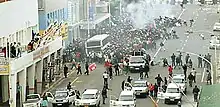Private security industry in South Africa
The private security industry in South Africa is an industry providing guarding, monitoring, armed reaction, escorting, investigating and other security-related services to private individuals and companies in the country. Over the years there has been tremendous growth in the private security industry, not only in South Africa, but also in the rest of the world.[1] The private security industry in South Africa is the largest in the world,[2] with over 10,380 registered companies and over 2.5 million registered security guards of which 556,000 active and a further 2 million reserves;[3] many times more than the available personnel of the South African Police Service and South African Army, combined[4] Studies have shown that South Africa had 2.57 private security personnel for every police employee.[5] This is attributed by some to the country's relatively high levels of crime to a lack of public funds from Parliament towards the South African Police Service (SAPS) or to an increasing trend in many countries towards government outsourcing of certain security functions.[6] Others have suggested the number of high-wealth individuals in South Africa in comparison with the rest of Africa has led to the growth of the industry.
Regulation
The private security industry in South Africa is regulated by the Private Security Industry Regulatory Authority, based in Centurion, Gauteng. The authority was established by the Private Security Industry Regulation Act, 2001 and commenced operations in 2002. The authority has wide-ranging powers relating to the operation of private security companies in South Africa. Private security companies are required by law to be registered with the authority.
2006 private security strikes

In 2006, private security personnel went on strike across South Africa. The strike lasted 96 days and cost the industry more than a million working days.[7] The strike was supported by the South African Transport and Allied Workers Union and 15 other trade unions.[8] The striking workers looted and damaged property, and committed violent crimes.[9][10]
Criticism
The Southern African Catholic Bishops' Conference criticised the private security industry in a 2012 briefing paper. The paper argued that the prevalence of private security in South Africa "perpetuates fear". The paper also noted that the private security industry "only protects the select and privileged group that can afford to pay for security services" and "exacerbates the divide between the wealthy and the poor".[11]
References
- "Recent Growth In The Private Security Industry | Building Security". www.buildingsecurity.com. Retrieved 11 December 2015.
- "South Africa has world's largest private security industry; needs regulation – Mthethwa". DefenceWeb. Retrieved 3 May 2013.
- "Security guards vs police officers in South Africa". BusinessTech. 13 May 2021.
- "Bigger than the army: South Africa's private security forces". CNN. 8 February 2013. Retrieved 3 May 2013.
- "Does SA have the largest private security industry in the world? - Africa Check". Africa Check. Retrieved 11 December 2015.
- "Global private security industry booms".
- Industrial Action – Annual Report 2006 (PDF). Department of Labour. p. 2. ISBN 978-0-9802645-6-2.
- Industrial Action – Annual Report 2006 (PDF). Department of Labour. p. 3. ISBN 978-0-9802645-6-2.
- Schroeder, Fatima (18 April 2006). "Shops looted as security strike continues". Cape Times. Retrieved 22 June 2009.
- "Strike Actions of Security Workers – QUESTIONS TO THE PRESIDENT OF THE REPUBLIC OF SOUTH AFRICA". Department of International Relations and Cooperation. 18 May 2006. Retrieved 22 June 2009.
- http://www.cplo.org.za/wp-content/uploads/2013/03/BP-313-The-Private-Security-Industry-Dec-2012.pdf